夏洛克的悲剧
探析《威尼斯商人》夏洛克的悲剧性原因
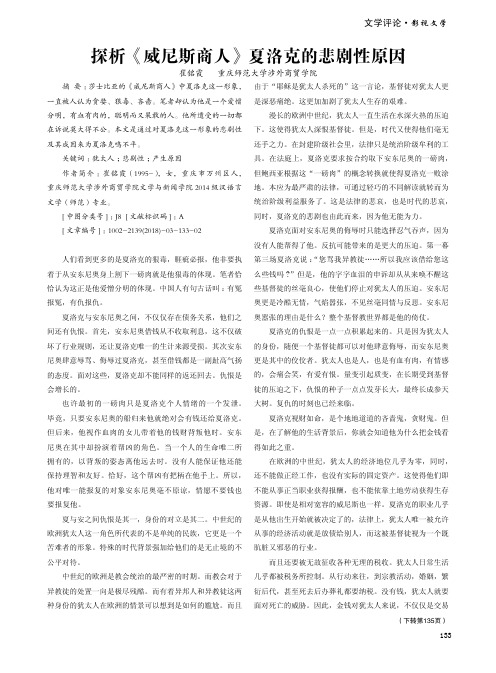
探析《威尼斯商人》夏洛克的悲剧性原因崔铭霞 重庆师范大学涉外商贸学院摘 要:莎士比亚的《威尼斯商人》中夏洛克这一形象,一直被人认为贪婪、狠毒、吝啬。
笔者却认为他是一个爱憎分明,有血有肉的,聪明而又果敢的人。
他所遭受的一切都在诉说莫大得不公。
本文是通过对夏洛克这一形象的悲剧性及其成因来为夏洛克鸣不平。
关键词:犹太人;悲剧性;产生原因作者简介:崔铭霞(1995-),女,重庆市万州区人,重庆师范大学涉外商贸学院文学与新闻学院2014级汉语言文学(师范)专业。
[中图分类号]:J8 [文献标识码]:A[文章编号]:1002-2139(2018)-03-133-02人们看到更多的是夏洛克的狠毒,睚疵必报,他非要执着于从安东尼奥身上割下一磅肉就是他狠毒的体现。
笔者恰恰认为这正是他爱憎分明的体现。
中国人有句古话叫:有冤报冤,有仇报仇。
夏洛克与安东尼奥之间,不仅仅存在债务关系,他们之间还有仇恨。
首先,安东尼奥借钱从不收取利息,这不仅破坏了行业规则,还让夏洛克唯一的生计来源受损。
其次安东尼奥肆意辱骂、侮辱过夏洛克,甚至借钱都是一副趾高气扬的态度。
面对这些,夏洛克却不能同样的返还回去。
仇恨是会增长的。
也许最初的一磅肉只是夏洛克个人情绪的一个发泄。
毕竟,只要安东尼奥的船归来他就绝对会有钱还给夏洛克。
但后来,他视作血肉的女儿带着他的钱财背叛他时。
安东尼奥在其中却扮演着帮凶的角色。
当一个人的生命唯二所拥有的,以背叛的姿态离他远去时。
没有人能保证他还能保持理智和友好。
恰好,这个帮凶有把柄在他手上。
所以,他对唯一能报复的对象安东尼奥毫不原谅,情愿不要钱也要报复他。
夏与安之间仇恨是其一,身份的对立是其二。
中世纪的欧洲犹太人这一角色所代表的不是单纯的民族,它更是一个苦难者的形象。
特殊的时代背景强加给他们的是无止境的不公平对待。
中世纪的欧洲是教会统治的最严密的时期。
而教会对于异教徒的处置一向是极尽残酷。
而有着异邦人和异教徒这两种身份的犹太人在欧洲的情景可以想到是如何的尴尬。
悲剧的民族英雄——夏洛克
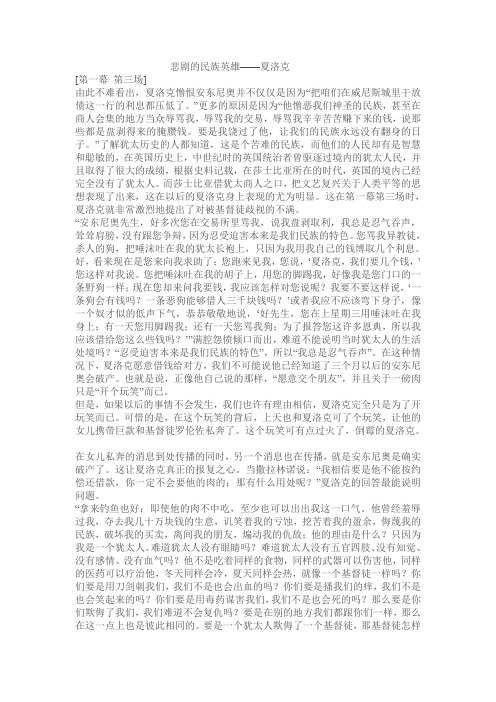
悲剧的民族英雄——夏洛克[第一幕第三场]由此不难看出,夏洛克憎恨安东尼奥并不仅仅是因为“把咱们在威尼斯城里干放债这一行的利息都压低了。
”更多的原因是因为“他憎恶我们神圣的民族,甚至在商人会集的地方当众辱骂我,辱骂我的交易,辱骂我辛辛苦苦赚下来的钱,说那些都是盘剥得来的腌臜钱。
要是我饶过了他,让我们的民族永远没有翻身的日子。
”了解犹太历史的人都知道,这是个苦难的民族,而他们的人民却有是智慧和聪敏的,在英国历史上,中世纪时的英国统治者曾驱逐过境内的犹太人民,并且取得了很大的成绩,根据史料记载,在莎士比亚所在的时代,英国的境内已经完全没有了犹太人。
而莎士比亚借犹太商人之口,把文艺复兴关于人类平等的思想表现了出来,这在以后的夏洛克身上表现的尤为明显。
这在第一幕第三场时,夏洛克就非常激烈地提出了对被基督徒歧视的不满。
“安东尼奥先生,好多次您在交易所里骂我,说我盘剥取利,我总是忍气吞声,耸耸肩膀,没有跟您争辩,因为忍受迫害本来是我们民族的特色。
您骂我异教徒,杀人的狗,把唾沫吐在我的犹太长袍上,只因为我用我自己的钱博取几个利息。
好,看来现在是您来向我求助了;您跑来见我,您说,…夏洛克,我们要几个钱,‟您这样对我说。
您把唾沫吐在我的胡子上,用您的脚踢我,好像我是您门口的一条野狗一样;现在您却来问我要钱,我应该怎样对您说呢?我要不要这样说,…一条狗会有钱吗?一条恶狗能够借人三千块钱吗?‟或者我应不应该弯下身子,像一个奴才似的低声下气,恭恭敬敬地说,…好先生,您在上星期三用唾沫吐在我身上;有一天您用脚踢我;还有一天您骂我狗;为了报答您这许多恩典,所以我应该借给您这么些钱吗?‟”满腔怨愤倾口而出,难道不能说明当时犹太人的生活处境吗?“忍受迫害本来是我们民族的特色”,所以“我总是忍气吞声”。
在这种情况下,夏洛克愿意借钱给对方,我们不可能说他已经知道了三个月以后的安东尼奥会破产。
也就是说,正像他自己说的那样,“愿意交个朋友”,并且关于一磅肉只是“开个玩笑”而已。
夏洛克的悲剧Shylock's Tragic
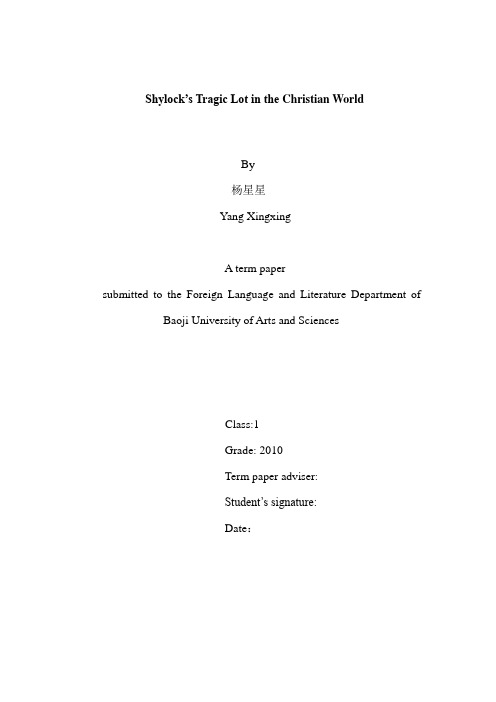
Shylock’s Tragic Lot in the Christian WorldBy杨星星Yang XingxingA term papersubmitted to the Foreign Language and Literature Department of Baoji University of Arts and SciencesClass:1Grade: 2010Term paper adviser:Student’s signature:Date:Shylock’s Tragic Lot in the Christian WorldI. IntroductionThe Merchant of Venice is one of Shakespeare’s most important comedic works. This drama is completed in 1596 in which the upsurge of Anti-Jewish still prevails. The theme of this play is defined as kindness, friendship, and love. Surely, we feel those emotions from Shakespeare’s depiction. However, what the play attracts me is not round the comedic element, but a tragic character-Shylock. It is necessary that Shylock obtains a miserable fate in the Christian world .The conflict between Judaism and Christianity. To some extent, the contradiction among Christians and Jews dooms that Shylock is a victim of tragedy. His tragic lot reflects the cruelty of religious conflict and presents the injustice to Jews in Christianity world. By analyzing unfair treatment to Jews in the Christian world, this essay will reveal the point that religious conflict leads to Shylock’s tragedy through analyzing unfair treatment to Jews in the Christian world.II . Shortage of means of sustenanceThe conflict between Christianity and Judaism makes it hard for Jews to make a living. Because of variously of stringent restrictions, Jews are compelled to become usurers. This chapter mainly introduces the hardship of survival of Jews and the reasons why Jews, like shylock engage this occupation.2.1 Restriction of living conditionAs today’s largest religious in the world, Christianity traces back a branch of Judaism. Christians consider that it is Jews who murder Jesus cruelly .So from the date of the birth of Christianity, Christians humiliate even hostel Jews and Judaism deeply. The extent of brutality Jews suffer can not be imaginable .the rights of life are restricted within a narrow range.The period of the fight between Christianity and Judaism is aggressive and grievous to Jews .On the economic field, European countries prohibit the Jews to occupy realestate in law. Meanwhile, Jews are also not allowed to farm. In the late Middle Ages, they limit Jews to go in for handcraft industry, trade, finance, and other field in order to protect national economy. Furthermore, the European rulers also adopt increasing income taxes, limiting employment, and other rigorous terms to achieve the purpose of plundering Jewish wealth. Entering Renaissance, almost all Jews are banished. The humanism of Renaissance advocates the hymn of human nature and defends human rights, while Jews are dumped on the fringes of history. (Cheng, 1999)2.2 Forced to become usurerJews have no choices but to be usurers in the extremely cruel pressure. Money lender is a way that Jews open up to survive in the adversity. This old-fashioned exploitation shames people in the prevailing social. But being a usurer ca make Jews survive in the Christian world. No money, the Jews inevitably doom to extinction. That the equity of survival needs money to guarantee forces Jews try their best to get money and have a strongly favorable impression on it. In the eyes of world, usury is a moral evil and usurers are greedy and grasped. For Shylock, he is so-called mammonist, miser, pinch fist. Are those characters leading to be affronted and humiliated? Even though Shylock is as kind as Antonio to lend money gratis, yet he can not get any respect, because he is a Jew. There, we have powerful evidence that Jews engaging in some usury career, which Christians consider as most dirty and despicable occupation, is a reflection of being oppressed by Christian world. If Shylock wants to establish himself in Christian society, being a usurer is his only choice. I admit that he is mean and greedy, but in that passive situation, those personalities of Shylock should gain our understanding.III.The miserable sufferingsIn the Merchant of Venice, Christians insult shylock with some discriminatory words, oppress them in every aspects. The seed of revenge is already buried deep in his heart. But in that period, the tragic end is confirmed.3.1 Endless insult and mental shockWe see indifference and humiliation to Jews everywhere in that period. As a usurer,Shylock has some treasure, but in the eyes of Christians, no matter how money he own, only he is a Jew, he surely stand a lower status. In Venice, Shylock is in an extreme state disadvantage in every aspect. Christians are free to ravage him. Antonio, he shows his kindness and love to anyone except Jews. He and other Christians, with racial superiority, bully Shylock without reasons. In the Merchant of Venice, Antonio calls Shylock “misbeliever”, “cut-throat dog”and even spilt upon Shylock’s Jewish gabardine. His fr iends swear Shylock “Jewish dog”, “wolves”, “evil”. Facing those hurling insults, Shylock do not do anything but forbear from speaking. Shylock is pathe tic, not only reflecting in his low social state, but also in his daughter’s betrayal. After Shylock’s wife died, h is only kinsfolk is his daughter. He never imagines his child, taking his money, elopes with a Christian. Daughter’s deception and Christian’s oppression enhances Shylock’s morale to revenge.3.2 The sentimental denouncementShylock accuses Christians of discriminating Jews, saying:‘he hath disgraces me, and hindered me half a million, laughed at my losses, mocked at my gains, scorned my nation, Thwarted my bargains, cooled my friends,heated mine enemies; And what’s his reason? I am a Jew. Hath not a Jew eyes?Hath not a Jew hands, organs, dimensions, senses, affections, passion? Fed with thesame food, hurt with the same weapons, subject to the same diseases, healed by thesame means, Warmed and cooled by the same winter and summer, as a Christiansis?’(Act III scene I P.74).Those words are sincere and sorrowful. As a pagan in Christian society, Shylock has a very strong adherence for ethnic discrimination and yearns for escalating the state of Jews. His words deserve our contemplation. He wants to get the equal rights to live. The denouncement, on the one hand, explains to us the Christians’serious discrimination and oppression to Jews. On the other hand, it also reflects the Jews’desolate conditions of existence. The hatred of Shylock to Antonio, to whole Christians is never dissipated. ‘If Jew wrongs a Christian, what is his humility? Revenge. If a Christian wrongs a Jew, what should his sufferance be by Christian example? Why, revenge.’(Act III Scene I p.74) In the perspective of Shylock, revengeis a way he chooses to fight Christians. He seems to gather all his energy to conduct the revenge. When the opportunity appears, he seizes this chance fling caution to the winds and lets off all injustice he suffers. Does he succeed? The answer is obvious. Jews never have an advantage dominating a whole Christian world. The tragic end has been doomed, while he affirms his revenge is going to realize. The tragedy presents more miserable in the extreme delight.IV.The predetermined failure in the trialThe state machine services in the ruling class. At tat time, the Christianity dominates the world. Firmly, the Christians never give Jews right to resist them. The trial is just a mendacious form to show Christians’ so-called justice. The forth chapter is main to the opinion that Jews’ real rights do not exist in the Christian world.4.1 The legal claim, but unreasonable treatJustice only belongs to Christians in that conflicting period. Objectively speaking, the term of cutting human flesh oversteps the moral line, but Antonio agrees that article and has a responsibility to obey it. Although Shylock’s attitude is aggressive, we also have mercy on him, as long as we understand the social circumstance where Shylock lives in .we put ourselves to think about it. If we exist in the surroundings where we can not reject any injustice and show our grievance, no matter what unfair affairs we suffer. Who can tolerate that? Is Shylock bounded to endure those injustices because he is a Jew? He wants to revenge Antonio through the law in the Christian world. That is impossible!In the court, even the highest Chief of Executive Duke of Venice, with obvious emotional tendency, says to Antonio, ‘I am sorry for thee: thou art came to answer a stony adversary, an inhuman wretch incapable of pity, void and empty from and dram of mercy.’(Act IV Scene I p.112) as a respective of justice, the Duke is less judicial equal, belittling Shylock in such words. Shylock fails to keep a clear head to project his hope of victory to Portia who is a judge, a Christian judge. She can not act her final interpretation of the law to protect Shylock’s right. Portia, standing by Christian, tampers with the concept and misinterprets the law to uphold Christians. Making anassumption, if Shylock gets a pound flesh from Antonio, what situation does he trap in? Due to the conflict between Christianity and Judaism, once Shylock achieves his right, he affirmatively suffer more sever living environment in return.4.2 The stark-naked exploitation in the name of lawThe tenet that the holiness of law lies in protecting the interests of everybody equally, regardless of race and religion is impractical in the class society. There is no law to protect Jews’ rights at the expens e of sacrificing Christians’ interests. In fact, there are no real rights and justices to Jews. “In any social formation, the protection of human right is not just law or legal system, and also do not rely on the declaration of political type of human rights.”(Chen 2006) No matter how the authorities of Venice flaunt their respect for human rights and compassion to Jews, their exploitation is covered by no means. Venice’s laws enact the term:‘If it be prov’d against an alien that by direct or indirect attempts, He seek s the life of any citizen, t he party’ ganist the whith he doth contrive shall seize one half his goods;The other half comes to the privy coffer of the state; And the offenders life lies in themercy of the duck only, ’gainst all other voice.’(Act III Scene I, p.132)It is evident that Christians oppressing and exploiting Jews. On the surface, in the final trail, Antonio renders his mercy to Shylock and quit the fine for one half of Shylock. In reality, he adopts a more brutal way to bully Shylock. T he belief is one’s spiritual pillar. What belief is to people is what navigation light is to mariners. In the name of law, forcing Shylock to change his belief, and destroying his spiritual pillar are absurd. We see that in the anti-Judaism of rolling turbidity, the Jews like Shylock all become victims. They fight for their own survival, screaming and struggling. “In the Renaissance, as well as the earlier period of history, religious discrimination against Jews in Europe is long-standing and deep- rooted. Thy never gully obtain the corresponding political rights, regardless of where and when, which makes them a vulnerable group. For a vulnerable group, the machine of state, laws, and human rights are all reverie.” (Zhu 2012)V.ConclusionAfter analyzing and discussing in the above chapters, the topic of full text is already self-evidence. All humiliations Shylock suffers are pure the racial discrimination and religious persecution. The Christians who call themselves embodiment of compassion and friendliness do not show one single dime to Jews. On the contrary, they bully and bush Jews anywhere and anytime. We can know Christians’ behavior to learn how brutal Christians are. Actually The Merchant of Venice is not a pure comedy. The tragic lot of Shylock reminds us of the cruelty of religious conflict. And this tragedy in the Christian world is only part of reflection that Jews inflict sadness in the anti-Jewish world.(1920 words)ReferencesShakespeare, William. The Merchant of Venice.Translated by Zhu Shenghao,Kun Ming:Yun Nan People Press , 2009ura. Willian Shkespeare’s The Merchant of Venice. Beijing: Foreign Language Teaching and Research Press, 1996陈幼斌,人员保障的几个原理性问题: 江西社会科学,2006(03)成亚君,夏洛克-反犹太教的牺牲品,教师论文集, 1999(5)朱飞镝,《威尼斯商人》中夏洛克形象的悲情解读:《长城》2012(08)外语系学年论文评分表。
夏洛克悲剧色彩分析

宗教角度
夏洛克生存的环境,正是基督教占统治地位的十六世纪的威尼斯,信奉犹太教的 夏洛克被称为“异教徒”。在当时的欧洲,犹太人被视为劣等民族,在宗教上受 迫害、政治上没有任何政治权利和自由,在经济上受到种种限制,就连居住区域 郁是划定的“隔都”。
浅析夏洛克的悲剧形象
他被刻画成一个贪得无厌、一毛不拔的吸血鬼,他的人 生目标就是追求金钱。一直以来,他是人们谴责和批判的对 象,受到了许多不公正的评价,而造成这种不公正评价是有 其深刻历史原固的。固此,在对这一人物进行详细分析之前, 我们有必要深入了解这一悲剧人物产生的时代背景,挖掘出 当时社会存在的民族矛盾和宗教冲突,使人们能更加公正客 观地来看待这一犹太名族的代表人物。
夏洛克的悲剧意蕴审视-精选文档

夏洛克的悲剧意蕴审视夏洛克是《威尼斯商人》中的重要人物形象。
《威尼斯商人》是一部喜剧,而夏洛克是一个典型的悲剧人物,是社会中的一个不幸者。
了解夏洛克这一艺术形象所蕴含的悲剧意蕴,有助于我们更好地认识和把握这一人物形象。
造成夏洛克人生悲剧的原因是多方面的,择其要,有以下数端:一夏洛克的种族悲剧在历史上,犹太民族是一个迭遭浩劫的居无定所的苦难民族,他们在中世纪的欧洲饱受歧视,就算是在文艺复兴时期其处境也不见得有多少好转。
高利贷者夏洛克是犹太人。
惟其如此,在基督教一统天下的威尼斯,他俯仰由人,备受歧视、践踏,处处遭到刁难,没有人的尊严,丧失了基本的社会地位。
富商安东尼奥与夏洛克的矛盾,虽然有经济利益上的冲突,但根本上是其种族和宗教信仰的矛盾。
剧中那些台面上的人物一方面道貌岸然地宣扬“基督教的精神”,另一方面又把把犹太人视为“异教徒”,加以厌弃和敌视。
他们永远不会给犹太教徒平等的待遇。
客观上,犹太民族所宗奉的教派相对弱小,更重要的,在威尼斯,基督教是正统的国教,是国家统治机器中的一个重要环节,当权者可以利用手中的权力,制造各种舆论,渲染种族仇恨,宣布犹太人是基督徒不共戴天的死敌。
在社会生活中,“群体的固化思维,群体的偏见定格都将对社会产生巨大的负向偏移”。
在剧作中,我们看到,在威尼斯,那些基督教徒们包括他们的仆人,一提起夏洛克来,都憎厌地称之为“犹太人”,甚至“犹太狗”。
在看似庄严神圣的法庭上,安东尼奥的朋友葛莱西安诺不顾身份,骂夏洛克是“万恶不赦的狗”、“性情像豺狼一样残暴贪婪”。
就连威尼斯的最高行政长官,作为法律和正义化身的公爵,面对手持证据与安东尼奥对簿公堂的夏洛克,也有违常规地带着明显的感情倾向,鄙夷地称之为“心如铁石的对手”、“不近人情的恶汉”。
特别是安东尼奥,常常无缘无故地羞辱他,离间他的朋友,煽动他的仇敌,多次在大庭广众之下咒骂他,肆无忌惮地把唾沫吐在他的犹太长袍上。
甚至拳脚相向,就像对待自家门口的一条野狗。
浅析《威尼斯商人》中夏洛克形象的悲剧性

浅析《威尼斯商人》中夏洛克形象的悲剧性——以家庭、经济、法律角度为观照对象邢宽摘要:莎士比亚的名剧《威尼斯商人》一直被理解为喜剧,其中夏洛克形象一直是广大专家学者和普通读者讨论的热点人物。
本文主要以家庭、经济、法律等社会角度为观照对象,力图阐释夏洛克形象的悲剧性。
关键词:《威尼斯商人》夏洛克悲剧性家庭经济法律威廉·莎士比亚(William Shakespeare,1564-1616)是英国文艺复兴时期的天才作家。
他是英国乃至世界上最有影响力的古典剧作家之一。
马克思称莎士比亚为“人类最伟大的天才之一”。
与他同时代的戏剧家本·琼生(Ben Jonson)也曾评价说:“He was not of an age,but for all time。
”(他不属于一个时代,而属于所有时代)。
他也因其在文学上的独特成就而成为历史上最有影响的100人之一。
《威尼斯商人》写于1596年,是莎士比亚戏剧中最富于社会讽刺意义的一部。
剧中主要肯定并赞美安东尼奥、鲍西亚等人以友谊、爱情为重的人文主义生活理想,否定并谴责以夏洛克为代表的唯利是图的生活态度。
剧中成功地塑造出夏洛克这样一个鲜明生动而又复杂矛盾的典型形象。
从1623年第一版《莎士比亚全集》开始,《威尼斯商人》一直被归类为喜剧,主要也是因为剧中夏洛克的生动刻画和结尾处三对恋人的完美结合。
重读《威尼斯商人》或是重看该剧的电影版,它带给我们的更多的是同情和心痛,为着夏洛克的家庭,经济,法律等社会方面的悲剧性。
本文将逐一分析,以资共赏。
家庭角度夏洛克唯一能爱和唯一爱的女儿杰西卡对他没有任何感激之情,毫不犹豫地与情人罗伦佐私奔,并卷走了他辛苦一生积累的财富。
众所周知这些财富是他用自己的人格尊严和社会声誉为代价换来的,是在基督教占统治地位的社会夹缝中得来的。
他唯一的女儿和唯一可以得到心理安慰的财富都一起投入到基督教徒罗伦佐的怀抱了。
夏洛克在大街上哭喊着“我的钱!我的女儿!”,这是何等的伤心。
试论《威尼斯商人》中夏洛克悲剧色彩
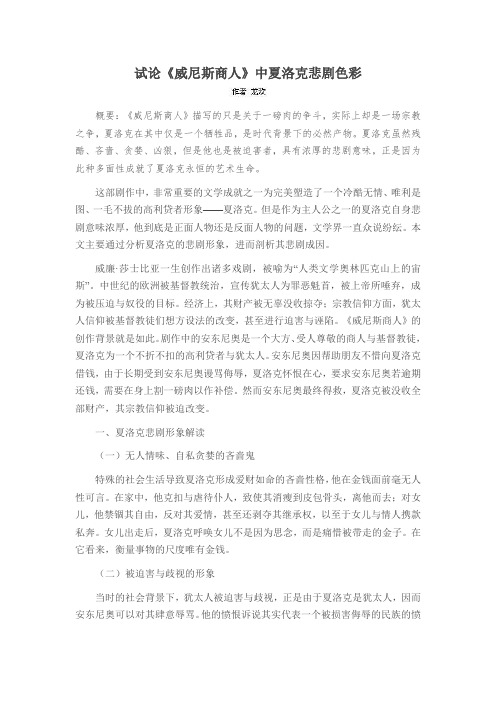
试论《威尼斯商人》中夏洛克悲剧色彩概要:《威尼斯商人》描写的只是关于一磅肉的争斗,实际上却是一场宗教之争,夏洛克在其中仅是一个牺牲品,是时代背景下的必然产物。
夏洛克虽然残酷、吝啬、贪婪、凶狠,但是他也是被迫害者,具有浓厚的悲剧意味,正是因为此种多面性成就了夏洛克永恒的艺术生命。
这部剧作中,非常重要的文学成就之一为完美塑造了一个冷酷无情、唯利是图、一毛不拔的高利贷者形象——夏洛克。
但是作为主人公之一的夏洛克自身悲剧意味浓厚,他到底是正面人物还是反面人物的问题,文学界一直众说纷纭。
本文主要通过分析夏洛克的悲剧形象,进而剖析其悲剧成因。
威廉·莎士比亚一生创作出诸多戏剧,被喻为“人类文学奥林匹克山上的宙斯”。
中世纪的欧洲被基督教统治,宣传犹太人为罪恶魁首,被上帝所唾弃,成为被压迫与奴役的目标。
经济上,其财产被无辜没收掠夺;宗教信仰方面,犹太人信仰被基督教徒们想方设法的改变,甚至进行迫害与诬陷。
《威尼斯商人》的创作背景就是如此。
剧作中的安东尼奥是一个大方、受人尊敬的商人与基督教徒,夏洛克为一个不折不扣的高利贷者与犹太人。
安东尼奥因帮助朋友不惜向夏洛克借钱,由于长期受到安东尼奥谩骂侮辱,夏洛克怀恨在心,要求安东尼奥若逾期还钱,需要在身上割一磅肉以作补偿。
然而安东尼奥最终得救,夏洛克被没收全部财产,其宗教信仰被迫改变。
一、夏洛克悲剧形象解读(一)无人情味、自私贪婪的吝啬鬼特殊的社会生活导致夏洛克形成爱财如命的吝啬性格,他在金钱面前毫无人性可言。
在家中,他克扣与虐待仆人,致使其消瘦到皮包骨头,离他而去;对女儿,他禁锢其自由,反对其爱情,甚至还剥夺其继承权,以至于女儿与情人携款私奔。
女儿出走后,夏洛克呼唤女儿不是因为思念,而是痛惜被带走的金子。
在它看来,衡量事物的尺度唯有金钱。
(二)被迫害与歧视的形象当时的社会背景下,犹太人被迫害与歧视,正是由于夏洛克是犹太人,因而安东尼奥可以对其肆意辱骂。
他的愤恨诉说其实代表一个被损害侮辱的民族的愤怒呼号。
《威尼斯商人》的夏洛克悲剧分析
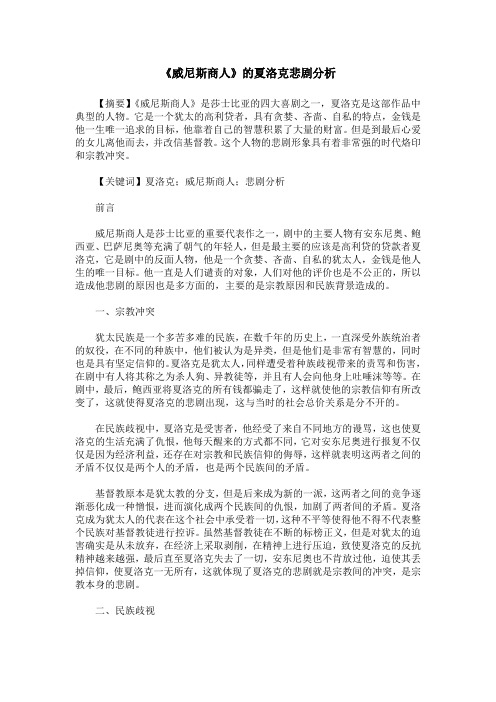
《威尼斯商人》的夏洛克悲剧分析【摘要】《威尼斯商人》是莎士比亚的四大喜剧之一,夏洛克是这部作品中典型的人物。
它是一个犹太的高利贷者,具有贪婪、吝啬、自私的特点,金钱是他一生唯一追求的目标,他靠着自己的智慧积累了大量的财富。
但是到最后心爱的女儿离他而去,并改信基督教。
这个人物的悲剧形象具有着非常强的时代烙印和宗教冲突。
【关键词】夏洛克;威尼斯商人;悲剧分析前言威尼斯商人是莎士比亚的重要代表作之一,剧中的主要人物有安东尼奥、鲍西亚、巴萨尼奥等充满了朝气的年轻人,但是最主要的应该是高利贷的贷款者夏洛克,它是剧中的反面人物,他是一个贪婪、吝啬、自私的犹太人,金钱是他人生的唯一目标。
他一直是人们谴责的对象,人们对他的评价也是不公正的,所以造成他悲剧的原因也是多方面的,主要的是宗教原因和民族背景造成的。
一、宗教冲突犹太民族是一个多苦多难的民族,在数千年的历史上,一直深受外族统治者的奴役,在不同的种族中,他们被认为是异类,但是他们是非常有智慧的,同时也是具有坚定信仰的。
夏洛克是犹太人,同样遭受着种族歧视带来的责骂和伤害,在剧中有人将其称之为杀人狗、异教徒等,并且有人会向他身上吐唾沫等等。
在剧中,最后,鲍西亚将夏洛克的所有钱都骗走了,这样就使他的宗教信仰有所改变了,这就使得夏洛克的悲剧出现,这与当时的社会总价关系是分不开的。
在民族歧视中,夏洛克是受害者,他经受了来自不同地方的谩骂,这也使夏洛克的生活充满了仇恨,他每天醒来的方式都不同,它对安东尼奥进行报复不仅仅是因为经济利益,还存在对宗教和民族信仰的侮辱,这样就表明这两者之间的矛盾不仅仅是两个人的矛盾,也是两个民族间的矛盾。
基督教原本是犹太教的分支,但是后来成为新的一派,这两者之间的竞争逐渐恶化成一种憎恨,进而演化成两个民族间的仇恨,加剧了两者间的矛盾。
夏洛克成为犹太人的代表在这个社会中承受着一切,这种不平等使得他不得不代表整个民族对基督教徒进行控诉。
虽然基督教徒在不断的标榜正义,但是对犹太的迫害确实是从未放弃,在经济上采取剥削,在精神上进行压迫,致使夏洛克的反抗精神越来越强,最后直至夏洛克失去了一切,安东尼奥也不肯放过他,迫使其丢掉信仰,使夏洛克一无所有,这就体现了夏洛克的悲剧就是宗教间的冲突,是宗教本身的悲剧。
- 1、下载文档前请自行甄别文档内容的完整性,平台不提供额外的编辑、内容补充、找答案等附加服务。
- 2、"仅部分预览"的文档,不可在线预览部分如存在完整性等问题,可反馈申请退款(可完整预览的文档不适用该条件!)。
- 3、如文档侵犯您的权益,请联系客服反馈,我们会尽快为您处理(人工客服工作时间:9:00-18:30)。
夏洛克的悲剧
时常是偶然的机遇,让我们与先贤不经意间邂逅。
与莎士比亚的第一次相会,便拜倒在他在《威尼斯商人》中展现的娴熟的语言技巧和引人入胜的情节之下,也深深地为他笔下那些活灵活现的人物所吸引。
不论是重义轻利的安东尼奥,真诚坦率的巴萨尼奥,还是聪明机智的鲍西亚,每当他们在这短短的剧本中吐露哪怕只言片语,便竟如跃然纸上,仿佛此刻你就是16世纪的英格兰贵族,身临伦敦古老的大剧院,细细品味着台上演员的每一谈吐举止,久久陶醉其中,以致忘身感怀,自己又似变成了安东尼奥或巴萨尼奥,在意识的舞台上享受文艺带来的愉悦与畅快。
当然,我们不能忘记,《威尼斯商人》的成功离不开巧妙的矛盾冲突,而这又要归功于一位不得不提的角色——阴险、狡诈、自私、狭隘的反面主角,犹太商人夏洛克。
人们时常把《威尼斯商人》看作一部结局美好的圆满剧。
大家都会为巴萨尼奥和鲍西亚两位有情人终结连理而感动,也会为夏洛克的阴谋最终未能得逞而喝彩,这也颇符合人类对真善美的质朴追求。
正派角色喜得良果,反派角色终遭恶报,也可谓圆满。
不过,如果我们换一个角度,从反派主角夏洛克的视角来观察,可绝非是一出圆满剧,而是一场不折不扣的悲剧,其情景真可借用朱自清的一句话来勾勒:“热闹是他们的,而我,什么都没有(《荷塘月色》)”。
在我看来,《威尼斯商人》就是一部夏洛克的悲剧。
我说这话并不是承认夏洛克是一个品德极其高尚、行为十分端正的君子,恰恰相反,正如莎翁笔下所展现的一般,他是一个不折不扣的唯利是图之小人。
但是,我不想分析夏洛克本人人性当中的品质到底有多坏,这一点莎翁在几百年前就已经点明,毋须多言。
而真正能给我感触,使我执笔写下这篇文章的,是他人性背后的诸多细节,那些不经意间从莎翁的笔尖流露出,却鲜为常人注视的瞬间,那些暗示了夏洛克悲剧的深刻原因的片段。
当安东尼奥和巴萨尼奥同去夏洛克住处寻求借贷时,夏洛克心生歹念,为接下来紧张而精彩的情节做了铺垫,可你是否还记得当时夏洛克因何心生歹念?
为此引原文如下:
夏洛克:……要是我有一天抓住他的把柄,一定要痛痛快快地向他报复我的深仇宿怨。
他憎恶我们神圣的民族,甚至在商人会集的地方当众辱骂我,辱骂我的交易,辱骂我们辛辛苦苦赚来的钱。
说那些都是暴利。
要是我饶过了他们,让我们的民族永远没有翻身的日子!
这一段隐含的信息颇有意思。
两千年前,一位学生问孔子“以德报怨,何如?”,孔子回答是“何以报德?以直报怨,以德报德(《论语·宪问》)。
”把孔老夫子和夏洛克的话对比一番,十分奇妙的事情便出现了。
前者是上古的先哲圣人,
后者是不折不扣的反派小人,竟然在上述问题上达成了某种“契合”。
当然,这“契合”只算是个戏谑的说法,否则孔圣人可就不得不沦为“真小人”了。
在夏洛克上述内心独白中,我看到了诸多隐藏在文字背后的支离线索。
犹太人、民族、辱骂、深仇宿怨……当种种破碎的片段重新经过拼接,才能把我们带入超出文本之外的深层次思考,才能解开夏洛克悲剧的深刻内涵。
大概此刻,诸位已经对我称这出剧是夏洛克的一出悲剧的原因,有了些许模糊的了解。
只要略懂历史,便知道一个犹太人在中世纪欧洲社会处境之艰辛。
莎翁是伟大的剧作家,他笔下的角色一定是有社会原型的,不知是有意还是无意,他把反派的帽子扣在了犹太人头上。
姑且不论他是否有反犹倾向,但至少从他笔下,我们能从一个缩影中窥探犹太民族在当时生活之一斑。
没错,夏洛克是个狡诈阴险的真小人,可我们的思维不能停留于此,而是要进一步探究,到底是什么造成了夏洛克之所以是个小人。
这个中内涵,一言以蔽之,就是夏洛克其实就是“社会谋杀”的牺牲品。
《独立宣言》第一句话便是人人生而平等,但许多人注定成为社会不平等的牺牲品。
当欧洲人对着犹太人表现他们的蔑视时,生于犹太这一民族本身就存在被不平等社会“谋杀”的风险,而夏洛克恰恰不幸是其中遭到“谋杀”以致人性堕落的一批。
我们始终倡言,人性本善。
不是夏洛克生来不选择善,而是社会压迫他选择了非善,所以夏洛克并非带着玩世不恭的心态来敲诈安东尼奥,他想做的,叫做复仇。
恐怕,世间没有比这更大的悲剧了。
夏洛克是一个虚构的文学人物,当我们扼腕叹息于牺牲在“社会谋杀”下导致的人性悲剧时,是否想到这个真实世界上,不知还有多少活生生的“夏洛克”。
他们默默承受着这个不平等社会压在他们肩上的重担,慢慢忍受着“社会谋杀”的慢性蚕食,也许在他们其中,并不乏夏洛克这般人性已堕,苦苦寻求“复仇”的牺牲品。
这恐怕也是人类社会的一出悲剧。
所以说,这是一部夏洛克的悲剧,更是对人类社会的一生叹息。
读罢《威尼斯商人》,真正留给我的,不是对夏洛克的憎恶,而是深深的同情。
[科]。
